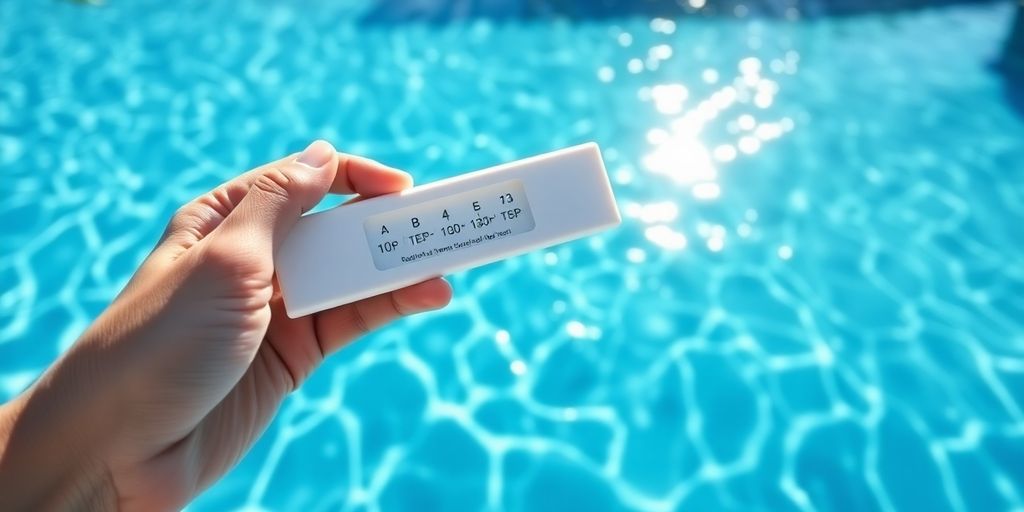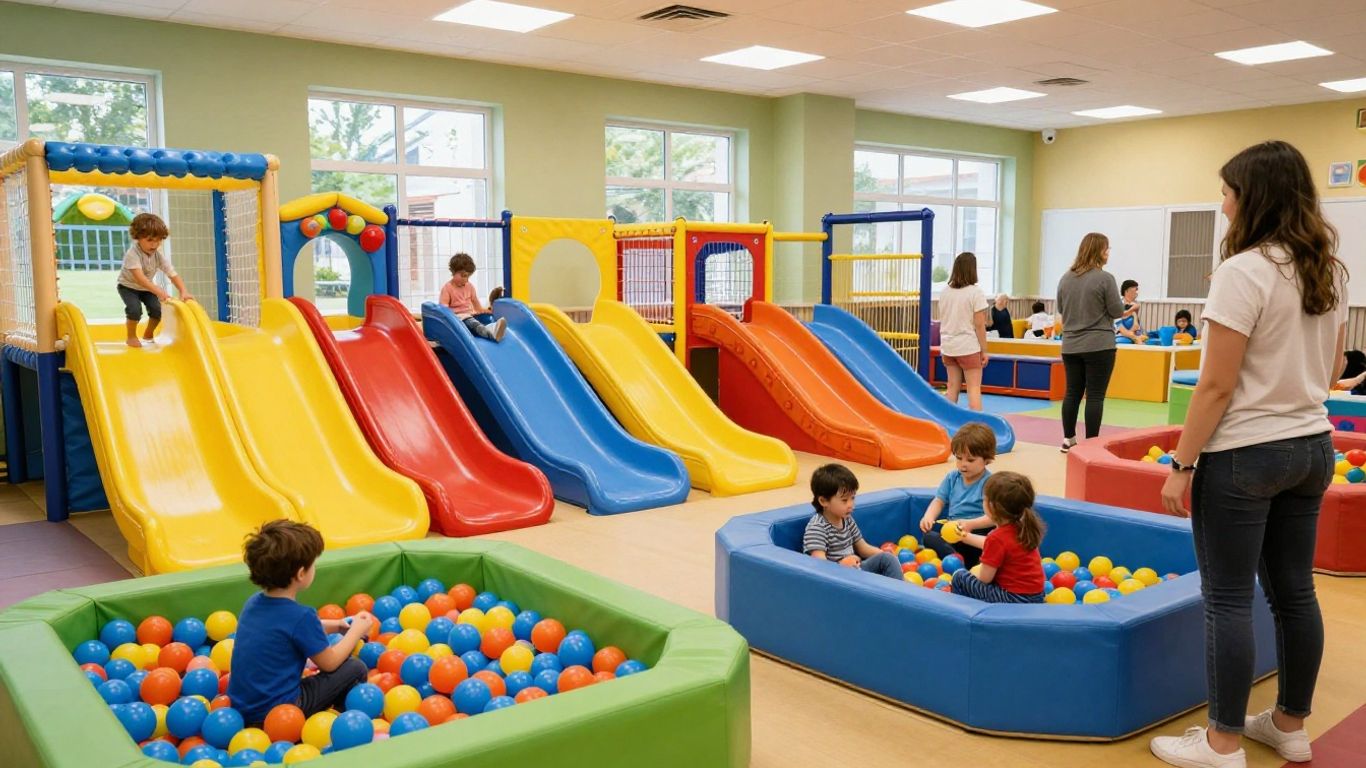Alright, listen up, fellow Aussies! If you’ve got a pool in your backyard, you know how good it is on a hot day. But keeping that water sparkling and safe for a dip? That’s where a good test kit comes in. It’s not just about chucking in some chemicals and hoping for the best. You need to know what’s going on in there. Finding the best pool test kit means you’ll have a top-notch swimming spot all summer long, without any nasty surprises.
Key Takeaways
- A good pool test kit keeps your water clear and stops you from wasting money on too many chemicals.
- You can pick from liquid kits, test strips, or fancy digital testers, depending on what you like.
- Always check chlorine, pH, alkalinity, and cyanuric acid to keep your pool happy.
- Aussie Gold kits are pretty popular here, but other brands like Zodiac and Taylor are good too.
- Store your kit properly and test often to keep your pool in tip-top shape.
Why a Top-Notch Pool Test Kit is Your Backyard’s Best Mate
Keeping Your Water Crystal Clear, Mate
Let’s be honest, nobody wants to swim in a murky swamp. A good pool test kit is your first line of defence against cloudy water. It helps you identify imbalances early on, so you can nip them in the bud before they turn into a full-blown algae bloom. Regular testing means you can adjust your chemicals proactively, keeping your water sparkling and inviting. Think of it as preventative medicine for your pool – a little effort now saves a lot of hassle later.
Avoiding Costly Chemical Cock-Ups
Pouring chemicals into your pool willy-nilly is a recipe for disaster, and a drain on your wallet. Over- or under-treating your pool can lead to all sorts of problems, from skin irritation to damaged equipment. A pool test kit takes the guesswork out of the equation. By accurately measuring your pool’s chemistry, you’ll know exactly what chemicals to add, and how much, saving you money and preventing unnecessary wear and tear on your pool.
The Secret to a Healthy Swimming Hole
Your pool isn’t just a place to cool off; it’s an ecosystem. Maintaining the right chemical balance is essential for keeping it healthy and safe for everyone. A good pool test kit allows you to monitor key parameters like chlorine, pH, and alkalinity, ensuring that your pool water is not only clean but also comfortable and free from harmful bacteria. Think of it as providing a safe and enjoyable swimming experience for your family and mates.
A pool test kit is more than just a tool; it’s an investment in the health and longevity of your pool. Regular testing and adjustment of pool chemical levels are crucial for preventing water problems and prolonging the life of pool equipment. It’s a small price to pay for peace of mind and a sparkling clean pool all summer long.
Decoding the Different Types of Pool Test Kits
Choosing the right pool test kit can feel like navigating a maze, but don’t stress, mate! There are a few main types, each with its own pros and cons. Let’s break them down so you can pick the best one for your needs.
The Classic Liquid Reagent Kits: Tried and True
These kits are the OGs of pool testing. They involve taking a water sample and adding drops of liquid reagents to it. You then compare the resulting colour change to a chart to determine the levels of different chemicals. They’re generally considered more accurate than test strips, but they do require a bit more effort and can be a tad fiddly. You’ll find these kits usually test for chlorine, pH, alkalinity, and sometimes calcium hardness and cyanuric acid. They’re a solid choice if you’re after reliable results and don’t mind putting in a bit of elbow grease.
Handy Dandy Test Strips: Quick and Easy Checks
Test strips are super convenient for a quick check of your pool water. You simply dip a strip into the water, wait a few seconds, and then compare the colours on the strip to a chart. They’re fast and easy to use, making them great for regular monitoring. However, they’re generally less accurate than liquid reagent kits, and the colour readings can sometimes be subjective. Plus, they can be affected by humidity, so you need to store them properly. If you’re after speed and ease of use and just need a general idea of your water chemistry, test strips are a good option. You can easily find pool water test kits online.
Digital Testers: For the Tech-Savvy Pool Owner
For those who love their gadgets, digital testers offer a high-tech approach to pool testing. These devices use electronic sensors to analyse your water sample and provide digital readouts of your chemical levels. They’re generally more accurate than test strips and eliminate the guesswork of comparing colours. However, they can be more expensive than other types of kits, and they require batteries and occasional calibration. If you’re after precision and don’t mind spending a bit more, a digital tester could be the way to go.
Choosing the right pool test kit really depends on your priorities. If accuracy is paramount, go for a liquid reagent kit or a digital tester. If you value convenience and speed, test strips are a good bet. Consider how often you plan to test your pool and how much time you’re willing to spend on the process. No matter which type you choose, regular testing is key to keeping your pool water sparkling clean and healthy.
Key Parameters Your Best Pool Test Kit Should Measure

Chlorine Levels: The Sanitisation Superstars
Alright, let’s get down to brass tacks. Chlorine is your main weapon against all the nasties that can turn your pool into a swamp. We’re talking bacteria, algae, the whole shebang. Keeping an eye on your chlorine levels is absolutely vital for a safe and enjoyable swim. Too little, and you’re basically inviting trouble. Too much, and you’ll end up with irritated skin and eyes. Aim for that sweet spot, usually between 1 and 3 ppm (parts per million). Regular testing is the only way to know for sure where you stand. You might need to consider swimming pool shock if your chlorine levels are consistently low, especially after heavy use or rainfall.
pH Balance: Keeping Your Water Comfy
Think of pH as the comfort level of your pool water. If it’s too high (alkaline), your water can get cloudy, and chlorine becomes less effective. If it’s too low (acidic), it can corrode your pool equipment and irritate your skin. Nobody wants that! The ideal pH range is usually between 7.2 and 7.8. Here’s a few things that can affect pH:
- Rainfall
- Bather load
- Chemical additions
Maintaining the correct pH balance is not just about comfort; it’s about protecting your investment and ensuring your sanitiser works properly. Neglecting pH can lead to a cascade of problems, costing you time and money in the long run.
Total Alkalinity: The pH Buffer
Total alkalinity (TA) acts like a buffer for your pH. It helps to keep your pH stable, preventing those wild swings that can be a real pain. If your TA is too low, your pH will bounce around like a kangaroo on a trampoline. Too high, and it’ll be difficult to adjust your pH at all. Aim for a TA between 80 and 120 ppm. It’s all about balance, mate.
Cyanuric Acid: Sunscreen for Your Chlorine
Cyanuric acid (CYA) acts like sunscreen for your chlorine. It protects it from being broken down by the sun’s UV rays. Without CYA, your chlorine will disappear faster than a cold beer on a hot day. But don’t go overboard! Too much CYA can actually reduce the effectiveness of your chlorine. A good range is usually between 30 and 50 ppm. Here’s a quick guide:
| CYA Level (ppm) | Effect |
|---|---|
| Below 30 | Chlorine degrades quickly in sunlight |
| 30-50 | Optimal chlorine protection |
| Above 50 | Chlorine effectiveness may be reduced |
Aussie Gold Test Kits: A Local Favourite
Aussie Gold is a brand that many pool owners down here in Australia know and trust. They’ve been around for a while, and you’ll often spot their kits on the shelves of local pool shops. They offer a range of options, from basic kits to more comprehensive ones, so there’s usually something for everyone, no matter your budget or how much testing you want to do. Let’s have a squiz at some of their popular options.
Aussie Gold 2-in-1: The Basics Covered
If you’re just starting out or want to keep things simple, the Aussie Gold 2-in-1 kit is a good starting point. It focuses on the two most important things: chlorine and pH levels. It’s pretty straightforward to use, and it gives you a quick snapshot of your pool’s health. For around $19, it’s a cheap way to start testing your pool water.
Aussie Gold 4-in-1: Stepping Up Your Testing Game
Ready to take your testing a bit further? The Aussie Gold 4-in-1 kit adds a couple more parameters to the mix: acid and alkalinity. This gives you a more complete picture of your pool’s water balance. It’s still easy to use, but it provides more detailed information, which can be helpful for fine-tuning your chemical treatments. Expect to pay around $35 for this one.
Aussie Gold 5-in-1 Strips: Convenience in a Flash
For those who want the ultimate in convenience, Aussie Gold’s 5-in-1 test strips are the way to go. These strips test for chlorine, pH, acid, alkalinity, and hardness. Just dip a strip in the water, wait a few seconds, and compare the colours to the chart on the bottle. It’s super quick and easy, perfect for busy pool owners. A bottle of these strips will also set you back around $19.
Choosing the right Aussie Gold kit really depends on your needs and how much detail you want in your testing. The 2-in-1 is great for beginners, the 4-in-1 offers a bit more depth, and the 5-in-1 strips are all about speed and convenience. No matter which one you choose, you’ll be keeping your pool in tip-top shape.
Beyond Aussie Gold: Other Reliable Brands Down Under
While Aussie Gold is a popular choice, there are other brands available in Australia that offer reliable pool testing solutions. Let’s have a squiz at some of them.
Zodiac Twist & Dose: Innovative Testing
The Zodiac Twist & Dose system is a bit fancy, offering a different approach to pool testing. Instead of traditional liquid reagents or strips, it uses pre-filled cartridges and a colour-matching system. It’s designed to be simple to use and reduce the chance of errors. It’s a good option if you’re after something a bit more modern and less fiddly than the standard kits. It’s worth checking out if you want to try innovative testing.
Taylor Complete Kits: Professional Grade Accuracy
Taylor kits are known for their accuracy and are often favoured by pool professionals. They use liquid reagents and a comparator block to determine chemical levels. While they might seem a bit more complex than test strips, they provide more precise readings. The Taylor Complete kits are a solid choice if you want to get serious about your pool chemistry and want the most accurate results possible. They are a bit pricier, but the accuracy is worth it for some.
Generic 4-in-1 Kits: Budget-Friendly Options
If you’re on a tight budget, generic 4-in-1 test kits can be a decent option. These kits usually test for chlorine, pH, total alkalinity, and cyanuric acid. They’re generally cheaper than branded kits, but the accuracy might not be as consistent. They’re fine for basic checks, but if you’re having trouble balancing your pool, it might be worth investing in a more reliable kit. Just remember, you often get what you pay for.
It’s important to remember that no matter which brand you choose, always follow the instructions carefully and store your kit properly to ensure accurate results. Regular testing is key to keeping your pool water balanced and healthy for swimming.
Tips for Getting the Most Out of Your Best Pool Test Kit

Storing Your Kit Like a Pro
Alright, so you’ve got your liquid test kit, now what? Don’t just chuck it in the shed and hope for the best! Proper storage is key to keeping those reagents fresh and accurate. Think of it like your sunscreen – you wouldn’t leave that baking in the sun, would ya? Keep your test kit in a cool, dry place, away from direct sunlight and extreme temperatures. This will stop the chemicals from degrading and giving you dodgy readings.
Following Instructions for Spot-On Readings
Yeah, yeah, we know, reading instructions is boring. But trust us, it’s worth it when it comes to pool testing. Each kit is a little different, and following the specific steps is crucial for getting accurate results. Don’t just guess – take the time to read the manual and understand how to properly use your kit. This includes things like how much water to sample, how many drops of reagent to add, and how long to wait for the colour to develop.
Regular Testing for Optimal Pool Health
Testing your pool water once in a blue moon isn’t going to cut it. To keep your pool sparkling and safe, you need to test regularly. How often? Well, that depends on how much you use your pool, the weather, and other factors. But as a general rule, aim to test at least once a week, and more often during periods of heavy use or after heavy rain. Think of it as a regular check-up for your pool – a little bit of effort now can save you a lot of headaches (and money) down the track.
Regular testing is the cornerstone of a healthy pool. By consistently monitoring your water chemistry, you can catch problems early and prevent them from escalating into bigger, more expensive issues. It’s all about staying ahead of the game and keeping your pool in tip-top shape.
Where to Snag the Best Pool Test Kit for Your Oasis
Local Pool Shops: Expert Advice and Hands-On Help
Popping down to your local pool shop is a ripper way to get your hands on a pool water test kit. The best part? You get to chat with the experts. They can suss out your specific needs, recommend the perfect kit, and even give you a demo on how to use it properly. Plus, you’re supporting a local business – bonus!
Online Retailers: Convenience and Wide Selection
If you’re after convenience, online retailers are your best bet. You can browse a massive range of kits from the comfort of your own couch. Just be sure to read the reviews before you buy, and double-check the shipping costs. Sometimes, those bargain prices aren’t so bargaintastic once you factor in delivery. You can often find great deals on Aussie Gold 4-in-1 kits online, too.
Considering Refill Packs for Ongoing Value
Once you’ve got your test kit sorted, don’t forget about the refills! Buying refill packs is way cheaper than buying a whole new kit every time you run out of reagents. Keep an eye out for deals on test kit refills, and stock up when you see them. Your wallet will thank you for it.
Getting your pool test kit is just the first step. Remember to store it properly, follow the instructions carefully, and test your water regularly. A little bit of effort goes a long way in keeping your pool sparkling clean and safe for everyone to enjoy.
Wrapping It Up: Your Pool, Your Choice
So, there you have it. Picking the right pool test kit for your backyard isn’t rocket science, but it does make a big difference. Whether you go for the simple strips, a liquid kit, or something a bit more techy, the main thing is to actually use it. Regular testing means a cleaner, safer pool for everyone. It stops those nasty surprises, like green water or itchy skin. Think of it as looking after your pool, so it can look after your good times. Happy swimming, mates!
Frequently Asked Questions
How often should I test my pool water?
You should test your pool water at least 2-3 times a week. If you’ve had a lot of people swimming, or after heavy rain, it’s a good idea to test it more often.
What if my test kit gives me strange results?
If your test kit gives you weird readings, first check that your kit isn’t expired. Make sure you’re following the instructions exactly. Sometimes, old or bad chemicals can give wrong results. If all else fails, take a water sample to your local pool shop for a professional check.
Can a good test kit actually save me money?
Absolutely! Testing your pool water helps you use the right amount of chemicals. This stops you from wasting money on too much, or not enough, which can lead to bigger problems down the track.
Do pool test kits expire?
It depends on the kit. Liquid kits usually last a fair while, but the little bottles of stuff (reagents) can go off. Test strips have an expiry date, so always check that. Digital testers need their sensors looked after and sometimes calibrated.
Can I buy refills for my test kit?
You can find refill packs for most liquid test kits and test strips. This is usually a cheaper way to keep your testing supplies topped up without buying a whole new kit every time.
What are the most important things a pool test kit should measure?
A good test kit should tell you about your chlorine levels (how clean your water is), pH balance (how comfy the water feels), total alkalinity (stops pH from jumping around), and cyanuric acid (protects your chlorine from the sun). Some kits also check for calcium hardness or other things.





